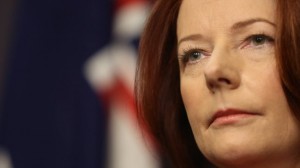ditch the what? women and australian politics

Image via Gary Ramage
It was March 2011. Over 3,000 people had gathered on the lawns of Parliament house. Weeks earlier, Prime Minister Julia Gillard had announced the government planned to introduce a carbon tax, a move seen in the eyes of the demonstrators as a broken promise, an outright scandal.
Thousands of vitriolic protesters – placards in hand – waited through a number of speeches for an address from then opposition leader Tony Abbott. The biggest signs in view had little to do with the carbon tax, or any policy for that matter. They attacked Julia Gillard directly; it was not for poor decision making or for unpopular policy, but for her femaleness. The slogans ‘Ditch the Witch’ and ‘Juliar… Bob Brown’s Bitch’ flanked Abbott as his address was broadcast over national television.
In the third episode of the ABC’s ‘real life political thriller’, The Killing Season, we were reminded of this unsettling moment in Australian politics. Gillard said about that day: ‘I really don’t know why this wasn’t a career-ending moment for Tony Abbott – sexism is no better than racism.’
It’s true Tony Abbott didn’t pen these signs himself, nor did he utter the slurs painted across them, though the act of delivering a speech in front of them can only be seen as a tacit endorsement of the intended sentiment. The lack of action over Abbott’s appearance, and his subsequent 2013 election success, cemented the alarming reality that blatant and damaging sexism remains rife within Australian politics and beyond.
With this in mind it comes as no surprise that, according to a survey conducted by Plan International of 1000 young women aged between 14 and 25, less than 1% of respondents were determined to pursue a career in politics. Plan International CEO Ian Wishart said of the survey results: ‘The fact that fewer than one per cent of them dream of a life in politics does not bode well for a future in which women can take their places in the corridors of power.’
The survey, undertaken in an attempt to gauge young women’s opinions and experiences with sexism, produced alarming results beyond the political realm – around 50% of young women have changed their career paths due to sexual discrimination, 75% have experienced sexist comments and more than 50% believe sexism is on the rise in Australia.
It is not difficult to understand why. Our first female Prime Minister was continually reminded of her gender and its imagined limitations. From questions about her sexual relationships to entire articles dedicated to slamming her choice of outfit, it was as if there was nothing more interesting about this woman than her potential partners or the tailor who cuts her jackets. In an interview with the BBC, Gillard lamented the absurdity of the issue: ‘You’ll gather [with other women leaders] and chat about common experiences, where there’s never-ending focus on appearance… people are too interested in the handbag rather than what you’re saying.’
Perhaps this skewed interest of females in power is a classic example of misdirection. A study conducted in 2011 on leadership found women outscored men in all but one of the 16 tested competencies. According to the researchers, ‘two of the traits where women outscored men to the highest degree – taking initiative and driving results – have long been thought of as particularly male strengths’. Based on these results, women arguably make better leaders than their male counterparts and this could be considered threatening by those still subscribing to traditional gender roles.
Although many young women are feeling progressively more uncomfortable about entering into male-centric professions, those without traditional gender beliefs are seemingly more inspired than ever to move into politics and other high-ranking careers, according to a study conducted by the University of Sydney earlier this year. As the study’s lead author Christopher Hunt proclaimed: ‘For women who rate themselves as non-conformists in regards to gender values, being reminded of Gillard’s difficulties motivated them to go into politics.’ The discussion here comes back again to our traditional ideas of gender. Top level positions, regardless of state or corporate entities, are still dominated by a dying breed of atavistic thinkers. Take Prime Minister (and Minister for Women) Tony Abbott for example; he still believes women are simply housewives that do a lot of ironing and virginity is the greatest gift a young woman can give. Let us hope, as they grow old and retire, their ignorance and bigotry will disappear with them.

